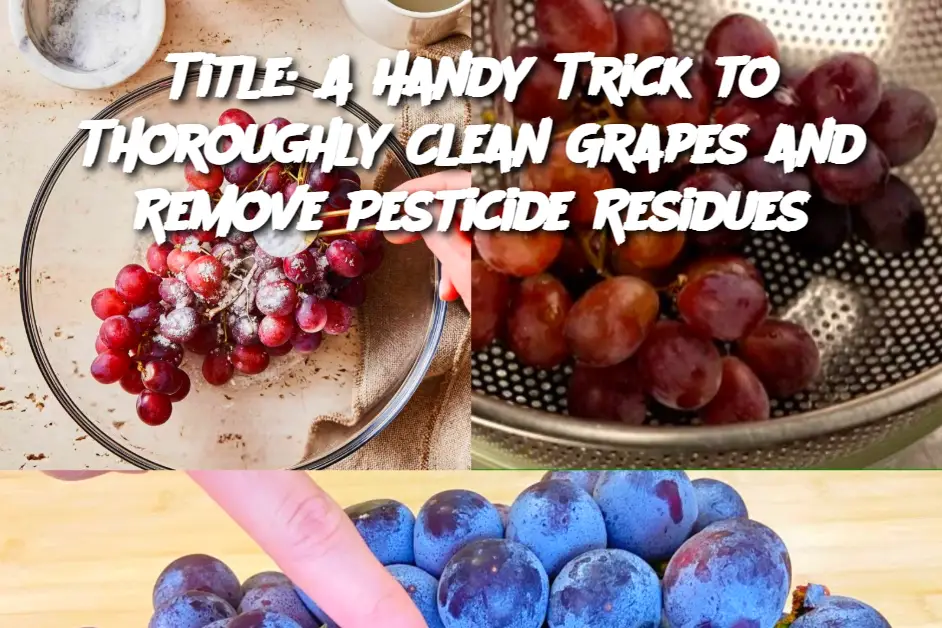-
Prepare the Cleaning Solution: Fill a large bowl or basin with about 1-2 cups of water, depending on the amount of grapes you plan to clean. Add 1 tablespoon of baking soda to the water and stir well. Baking soda is a natural, non-toxic substance that can help break down pesticide residues on the surface of fruits.
-
Soak the Grapes: Place the grapes in the water and baking soda solution. Gently stir the grapes in the solution to ensure they are completely submerged. Let them soak for about 10-15 minutes. This soaking process helps loosen any pesticide residue and dirt that may be clinging to the skin of the grapes.
-
Scrub and Rinse: After soaking, gently scrub the grapes with your hands or use a soft brush to rub the skins. This will help remove any remaining residue or dirt. Then, pour the grapes into a colander or sieve and rinse them thoroughly under cold running water. Make sure to rinse them well to remove any remaining baking soda solution.
-
Dry the Grapes: Once the grapes have been rinsed, place them on a clean towel or paper towels to dry. Gently pat them dry or let them air dry before storing them in the refrigerator or enjoying them.
Serving and Storage Tips:
-
Serving Tip: After cleaning your grapes, they’re ready to eat on their own, add to salads, or use in smoothies. Enjoy them as a snack or incorporate them into various recipes!
-
Storage Tip: Store washed and dried grapes in an airtight container in the refrigerator. This will help maintain their freshness and prevent spoilage. You can also freeze grapes for later use in smoothies or as a refreshing frozen snack.
Variants:
-
Vinegar and Baking Soda Solution: If you prefer using vinegar for cleaning, mix 1 part white vinegar with 3 parts water and add 1 tablespoon of baking soda. Soak the grapes in this solution for 10-15 minutes, then rinse well under water. Vinegar has natural antibacterial properties, and combined with baking soda, it’s very effective at cleaning produce.
-
Lemon Water Soak: Instead of baking soda, you can use a mixture of water and freshly squeezed lemon juice (about 1 tablespoon of lemon juice per cup of water). This natural acidic solution can help break down pesticide residues and bacteria on the skin of grapes.
FAQ:
Q: Why is it important to clean grapes thoroughly? A: Grapes are often treated with pesticides to protect them during growth, which can leave residues on the skin. Washing them thoroughly helps remove these harmful chemicals and makes the grapes safer to eat.
Q: Is washing grapes with just water enough to remove pesticides? A: While washing grapes under running water can remove some dirt, it doesn’t always eliminate all pesticide residues. Using a baking soda solution is more effective at breaking down the chemicals left on the surface.
Q: Can I clean grapes with soap or dishwashing liquid? A: It’s not recommended to use soap or dishwashing liquid to clean grapes, as these products are not food-safe and can leave harmful residues behind. Natural solutions like baking soda or vinegar are safer alternatives.
Q: Can I use this method on other fruits and vegetables? A: Yes! This method works well for many other fruits and vegetables, including apples, berries, and leafy greens. The baking soda solution is safe and effective for cleaning a wide range of produce.
Q: How can I prevent pesticide residues on grapes in the future? A: Buying organic grapes, which are grown without synthetic pesticides, is one way to reduce your exposure to harmful chemicals. However, even organic produce should be washed thoroughly to remove any dirt or residues from natural pesticides.
